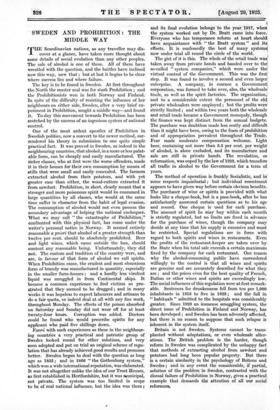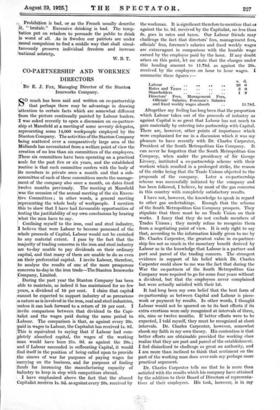SWEDEN AND PROHIBITION : THE MIDDLE WAY
THE Scandinavian nations, as any traveller may dis- cover at a glance, have taken more thought about some details of social evolution than any other peoples. The sale of alcohol is one of these. All of them have wrestled with the question, and the battles have inclined now this way, now that ; but at last it begins to be clear where success lies and where failure.
The key is to be found in Sweden. At first throughout the North the master zeal was for stark Prohibition ; and the Prohibitionists won in both Norway and Finland. In spite of the difficulty of resisting the influence of her neighbours on either side, Sweden, after a very brief ex- periment in Prohibition, sought a middle way—and found it. To-day this movement towards Prohibition has been scotched by the success of an ingenious system of national control.
One of the most ardent apostles of Prohibition in Swedish politics, now a convert to the newer method, sur- rendered his theory in submission to one quite simple practical fact. It was proved in Sweden, as indeed in the neighbouring countries, that alcohol, in a more or less palat- able form, can be cheaply and easily manufactured. The richer classes, who at first were the worse offenders, made it in their houses for their own consumption by means of stills that were small and easily concealed. The farmers extracted alcohol from their potatoes, and with yet greater ease than either, the wood-cutters extracted it from sawdust. Prohibition, in short, clearly meant that a stronger and more poisonous spirit would be consumed in large quantities by all classes, who would at the same time suffer in character from the habit of legal evasion. . The consumption of alcohol would not even possess the secondary advantage of helping the national exchequer. What we may call " the catastrophe of Prohibition," confronted with this physical fact, has come under the writer's personal notice in Norway. It seemed entirely reasonable a priori that alcohol of a greater strength than twelve per cent. should be absolutely prohibited. Beer and light wines, which came outside the ban, should content any reasonable being. Unfortunately, they did not. The custom and tradition of the country were, and are, in favour of that form of alcohol we call spirits. When Prohibition came, the crudest and most obnoxious form of brandy was manufactured in quantity, especially in the smaller farm-houses ; and a hardly less virulent liquid was smuggled in from Continental ships. It became a common experience to find victims so pro- grated that they seemed to be drugged ; and in many works it was hopeless to expect labourers and artisans to do a fair quota, or indeed deal at all with any fine work, thrciughout Monday. The effects of the poison absorbed on Saturday and Sunday did not wear off for at least twenty-four hours. Corruption was added. Doctors could be found who yould prescribe spirits for any applicant who paid five shillings down.
Factei with such experiences as these in the neighbour- ing countries a very practical and patriotic group of Swedes looked round for other solutions, and very soon adopted and put on trial an original scheme of regu- lation that has already achieved good results and promises better. Sweden began to deal with the question as long ago as 1855 ; and in 1866 " the Gothenburg system," which won a wide international reputation, was elaborated. It was not altogether unlike the idea of our Trust Houses, as first established in Hertfordshire, but it was municipal, not private. The system was too limited in scope to be of real national influence, but the idea was there ; and its final evolution belongs to the year 1917, when the system worked out by Dr. Bratt came into force.: Everyone who has temperance reform at heart should have acquaintance with " the Bratt system " and i effects. It is confessedly the best of many syst now under trial all round the circle of the world. The gist of it is this. The whole of the retail trade wasi taken away from private hands and handed over to the so-called " system companies," which were under the virtual control of the Government. This was the fi step. It was found to involve a second and even large enterprise. A company, in essence a Covernmen corporation, was formed to take over, also, the wholesal trade, as well as the spirit factories. The organization, and to a considerable extent the personnel of the old private wholesalers were employed ; but the profits werd strictly limited ; and within two years both the wholesale and retail trade became a Government monopoly, though the finance was kept distinct from the annual budgets. The purchase was doubtless made less costly and difficult than it might have been, owing to the fears of prohibition and of appropriation prevalent throughout the Trade. Fear made moderate compensation welcome. Light beer, containing not more than 3.2 per cent. per weight of alcohol, is alone excluded, and its manufacture and sale are still in private hands. The revolution, of reformation, was coped by the law of 1928, 'which transfers all traffic in alcohol to the Government for a term of years.
The method of operation is frankly Socialistic, and in' some respects inquisitorial ; but individual resentment appears to have given way before certain obvious benefits. The purchaser of wine or spirits is provided with what looks like a cheque-book, but is a pass-book, after he has satisfactorily answered certain questions as to his age and record. One cheque is used for each purchase. The amount of spirit he may buy within each month is strictly regulated, but no limits are fixed in advance for the purchase of wines, though the company may decide at any time that his supply is excessive and must be restricted. Special regulations are in force with regard to both spirits and wines in restaurants. Even the profits of the restaurant-keeper are taken over by the State when his total sale exceeds a certain maximum fixed by the company for each restaurant. One reason why the alcohol-consuming public have surrendered willingly to the control is that all wines and spirits are genuine and are accurately described for what they are ; and the prices even for the best quality of French, Italian or other wines and spirits are exceedingly low. The-social influences of this regulation were at first remark- able. Sentences for drunkenness fell from ten per 1,000 inhabitants in 1913 to five in 1923 ; and the fall in " habituals " admitted to the hospitals was considerably greater. Since 1928 an immense smuggling system, the direct issue of Prohibition in Finland and Norway, has been developed ; and Sweden has been adversely affected, but there is no reason to suppose that such relapse is inherent in the system itself.
Britain is not Sweden. Systems cannot be trans- planted without adaptations, or even wholesale alter- ations. The British problem is the harder, though reform in Sweden was complicated by the unhappy fact that methods of extracting alcohol from sawdust and potatoes had long been popular property. But there is a certain similarity in the psychology of Britons and Swedes ; and in any event the considerable, if partial, solution of the problem in Sweden, contrasted with the dismal failure of Prohibition in Norway, gives a practical, example that demands the attention of all our social reformers. Prohibition is bad, or as the French usually describe it, " brutale." Excessive drinking is bad. The temp- ttation put on retailers to persuade the public to drink as worst of all. As in Sweden our patriots are under !moral compulsion to find a middle way that shall simul- ; )taneously preserve individual freedom and increase 'national sobriety.
W. B. T.



































 Previous page
Previous page